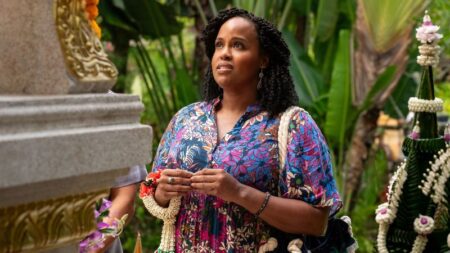In the latest installment of “The White Lotus” Season 3, specifically in episode 6, the narrative dives deeper into the tangled web of relationships and emotional turmoil that characterizes the series. The episode opens with Saxon Ratliff recovering from a rambunctious party the night before, which serves as a prime illustration of the chaotic energy that envelops the luxurious yet tragically flawed resort. As the plot unfolds, viewers are given a front-row seat to the complexities of human connections that are forever shifting under the vibrant, sun-soaked facade of paradise.
Kate, a prominent figure in this season, encounters Valentin, leading to an awkward display of what is referred to as a “walk of shame” outside Jaclyn’s residence. This moment sets the stage for rising tensions as Laurie, another character, expresses her irritation with Kate’s actions. The dialogue between Laurie and Jaclyn is particularly telling, showcasing the budding resentment that exists in their friend circle. The condescending remarks made by Jaclyn towards Kate about how they should handle gossip among friends create a palpable sense of conflict, exemplifying how honesty can sometimes lead to more complex entanglements.
Actor Leslie Bibb, who plays Kate, noted that had the trio confronted their feelings honestly from the outset, the ensuing chaos could have been avoided. However, it is this very chaos that hooks the audience and creates engaging television. The episode culminates with Jaclyn admonishing Kate about the scrutiny that comes with public life, suggesting that the foundation of their friendship is built on misleading pretenses. This tension foreshadows possible confrontations in the episodes to come.
Simultaneously, Saxon and his brother Lochlan grapple with confusing memories from their drug-fueled escapades. Their night on the yacht culminated in emotional and physical entanglements, temporarily blurring the lines of brotherhood and complicating their relationship. As they struggle with their choices, notably Saxon’s attempts to deflect blame onto the influence of substances, affectionate and intimate dynamics emerge that call into question broader themes of consent and responsibility.
In an interesting twist, the plot introduces a firearm through Gaitok, who mirrors a “luckiest guy ever” persona while discovering the weapon in the shadows of the Ratliffs’ villa. His capability at the gun range suggests potential for future plot developments, perhaps indicating a broader collision of themes involving danger and unpredictability.
The character of Timothy finds solace through the words of a Buddhist monk, Luang Por Teera, who presents philosophical takes on life and death. His serene demeanor contrasts sharply with the other characters, especially Timothy’s wife, who seems perplexed by his sudden embrace of spirituality in the face of existential crises. This subplot continues to explore the characters’ confrontations with their own vulnerabilities against the backdrop of a stunning yet superficial world.
Victoria, Timothy’s wife, further exemplifies the episode’s critique of privilege and entitlement when she expresses her disdain towards the thought of their daughter Piper becoming financially responsible and aware of poverty. Such dialogues between Victoria and Timothy raise questions about societal norms concerning wealth, stability, and the importance of humility in contemporary life.
The episode ends with multiple cliffhangers that build anticipation for the next chapters. Belinda’s renewed conflict with Gregary invites an array of emotional confrontations while reflecting the dire emotional stakes around the characters at the resort.
At its core, episode 6 of “The White Lotus” encapsulates the essence of modern human dynamics—misunderstandings, entitlements, and the ultimate search for identity amid chaos. The interplay between humor and poignancy captures the series’ spirit, where laughter mingles with discomfort, and beauty is layered with underlying pain. As viewers engage with these characters, various memorable one-liners resonate deeply, illustrating how each individual navigates their own truths against the stark reality presented by their relationships and societal pressures.
“The White Lotus” captivates its audience every Sunday at 9 p.m. EDT on HBO, with episodes accessible for streaming on Max, inviting ongoing engagement with this richly layered storytelling that combines comedy, tragedy, and emotional introspection.











